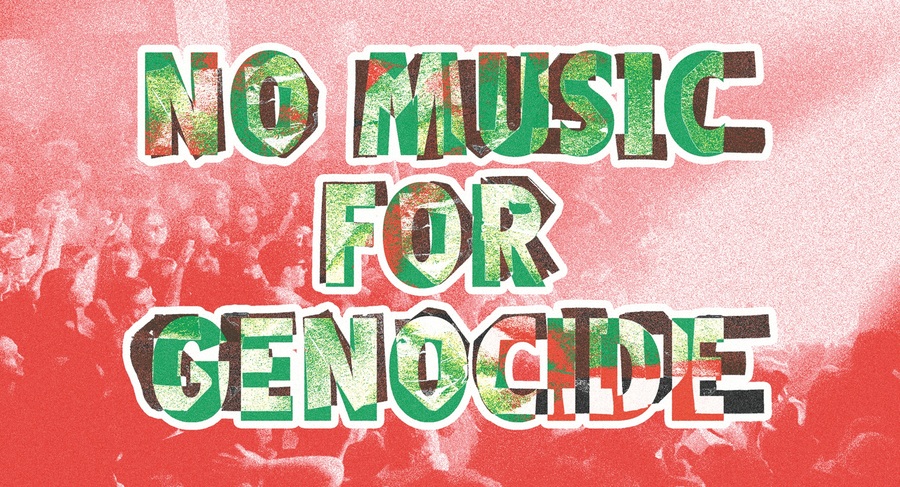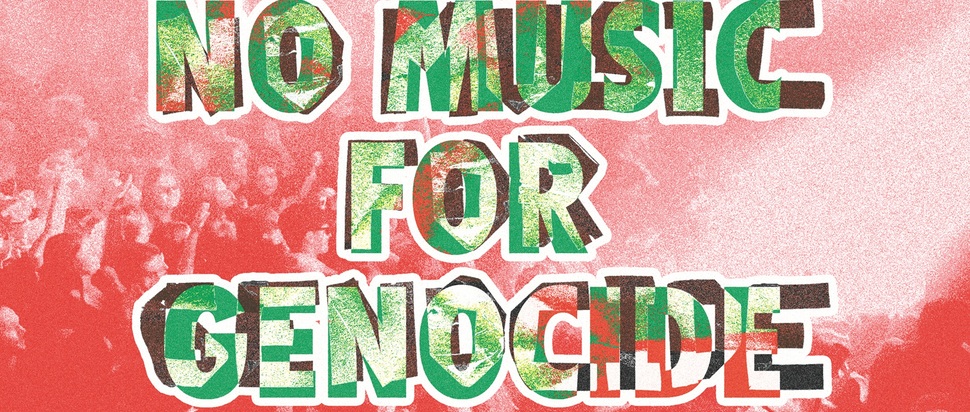No Music For Genocide: Collective Action is Material Solidarity
As the international music community rallies behind the No Music For Genocide campaign with artists continuing to geo-block their music from streaming platforms in Israel, we find out more about the campaign and what local artists are doing to contribute
No Music For Genocide, a cultural boycott of Israel launched in September with 400 artists and record labels signed on to a pledge to geo-block their music from being accessible on streaming platforms within the occupying territory. In the campaign's mission statement the organisers laid out the strategy behind the NMFG campaign: “This tangible act is just one step toward honouring Palestinian demands to isolate and delegitimise Israel as it kills without consequence on the world stage.” Utilising the economic power held in collective action, the international music community has rallied behind NMFG’s campaign with the signatories having more than doubled in only one month to over 1000 participating members, including Lorde, Amyl and the Sniffers, Björk, the estate of Ryuichi Sakamoto, Japanese Breakfast and Kneecap.
At the heart of NMFG’s cultural boycott are the Palestinian people, who have resisted the Israeli occupation of their land for the last 77 years. Following the release of Toronto-based, Palestinian musician Nemahsis’ music video covering the nostalgia-fuelled Lorde track Team, the artist was interviewed by the NMFG campaign. Nemahsis’ interview began with the announcement that she had joined the campaign to boycott Israel. In the interview, published to NMFG’s Instagram, Nemahsis shared the experience of her grandma’s forced isolation due to her fear of displacement from her home. Nemahsis explained: “Last year I was home in Jericho, in the occupied West Bank. My grandma wouldn’t leave home to restock her fridge because she was afraid settlers would come and steal our house.” Nemahsis’ music video shows the stunning creation of Handala, a symbol of Palestinian resistance and the struggle for Palestinian liberation. Nemahsis’ family’s resistance to displacement from her home by Israeli settlers makes Handala, in this instance, also symbolise both the injustice and steadfast resilience of her grandmother's inability to leave her home to do something as routine as grocery shopping.
To ground the NMFG campaign within the local music scene I spoke to Scottish artists about the reasons behind their pledge to join the NMFG campaign. Jolon Yeoman of Knockwood Studio emphasises his motivation to have the studio join due to “the unavoidable fact that a genocide of an entire people is being committed right in front of our eyes. I never once expected to open my phone to see the charred remains of a child, yet for over two years I’ve seen it almost every day.” The horror of genocide necessitates economic pressure which can create enough power to put a dent in the killing machine that supplies weapons to Israel. Yeoman’s transparently aware of this; “If we are to make the ‘Israeli’ settler-colonial project unviable we have to make it a ‘bad return’ for investors. To do this we need to follow BDS (Boycott, Divestment, Sanctions) guidelines in all parts of our lives.” As working artists, folks like Yeoman who run studios are engaging BDS in their labour practices by joining the NMFG campaign and having previously joined the PACBI (Palestinian Academic & Cultural Boycott of Israel) a year ago.
Johnny Lynch, the Isle of Eigg-based artist behind Pictish Trail and DIY label Lost Map Records shares some of the practical process behind geo-blocking music from streaming platforms. “One of our artists on the label contacted me recently asking if we could remove their music from being distributed digitally in Israel. We spoke with our distributor, a Scottish company called EmuBands, to see if that was possible.” Lynch continues, sharing a one-off experience that’s a testament to communities' inclination in the local Scottish music industry to help each other. “Initially it seemed that to geo-block a release would mean taking it down and re-uploading it again – which incurs a charge per release – but on this occasion EmuBands were really helpful and managed to geo-block Israel from that artist’s catalogue immediately.”

Illustration by Megan Barclay.
Given the fee associated with geo-blocking music from Israel, Lost Map Records hasn’t joined the NMFG campaign. Lynch explains that, “As a label we discussed applying this across all our releases, but with over 350 titles available on streaming platforms, the costs [and time] of re-uploading everything would run into the thousands – simply beyond our means as a small, DIY operation.” Given the financial resources needed to geo-block music from artists' discography, it’s important to consider how class difference affects artists' ability to participate in this cultural boycott of Israel. Especially when Lynch ends by telling me, “If geo-blocking were as simple as flicking a switch, I wouldn’t have hesitated to take part in the campaign.” For example, on the other side of the coin, a bigger artist, such as Hayley Williams was able to lean on financial resources and the support of her team to get her new album Ego Death at a Bachelorette Party and Paramore’s decades-long discography geo-blocked from Israel when she and the band became signatories of the NMFG campaign.
Even with the financial concerns that can restrict smaller artists from geo-blocking their back catalogue from streaming platforms in Israel, Edinburgh-based goth rock'n'roller Dylan Wilson is one example of an indie artist who has signed on to NMFG and geo-blocked their new single from streaming in Israel even though geo-blocking their previously released music is not financially feasible at the moment. While speaking with Wilson, he explains the behind-the-scenes process of geo-blocking the band's music. “Our new single, The Camera Girl’s Genius, was blocked from release in Israel without issue, and was very easy to handle through our distributor. To block our previous releases, however, there is no way to change the release territory without taking them off streaming, and paying to release them over again.” Wilson has proved to create an important alternative avenue for joining the cultural boycott of Israel given their financial restrictions as an indie band.
As the NMFG campaign continues to update their list of signatories and put out media on their Instagram account highlighting big name artists who have joined the cultural boycott, the campaign has also emphasised that the isolation and delegitimisation of Israel via a boycott is only one of their organising goals. Galvanising the collective power harnessed from their signatories in the international music community, the NMFG campaign wrote in a statement published to their Instagram, is the bigger picture behind this campaign. In that statement they said: “This boycott is just the tip of the spear. We wanted to encourage our peers to directly challenge their own ecosystems while fostering open dialogue, and we’re excited to witness that rapidly materialise and expand.”
There’s the potential for NMFG to collaborate with local chapters of Punks Against Apartheid – established in 2011 with chapters across the globe – and other grassroots movements that focused on their local music and club scenes' ability to stand in solidarity with the people of Palestine. It’s tantamount that collective action focused on economic power leads to direct action efforts that target the profitability of businesses invested in Israel’s occupation of Palestine. From organising efforts against weapons manufacturers, such as the New York City-based grassroots organisation Demilitarize Brooklyn Navy Yard to the boycott of the London-based entertainment company Boiler Room via organising efforts against their international events by Ravers for Palestine, the NMFG campaign has the potential to amplify and further activate direct action that have grassroots organising efforts behind them already.
The No Music For Genocide campaign has received an overwhelmingly positive reaction with artists joining the cultural boycott of Israel in droves. Spotlighting the appetite within the international music community to materially stand in solidarity with the Palestinian people as they resist occupation and genocide in Palestine. The last two years of Israel’s livestreamed violence against the Palestinian people in Gaza and heightened international knowledge of settler attacks against Palestinian people who live in the occupied West Bank – such as Nemahsis’ family back home in Jericho, Palestine – have woken the world up to the Israeli entity’s intrinsic violence as a settler-colonial state. No Music For Genocide is a starting point for artists to materially support the Palestinian people by joining the cultural boycott of Israel. From there the campaign seems to be on track to educate their signatories on how to join and amplify grassroots direct action organising for Palestinian liberation that’s occurring in the city or town that houses their local music or club scene.
For more information on the No Music For Genocide campaign head to nomusicforgenocide.org or follow them on Instagram @nomusicforgenocide
